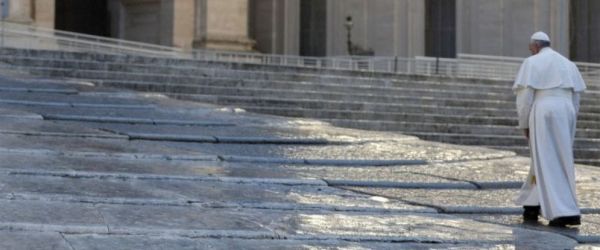Today the Gospel presents the well-known parable of the “Good Samaritan” (cf. Lk 10:25-37). When questioned by a doctor of the law on what is necessary to inherit eternal life, Jesus invites him to find the answer in the Scriptures, and says: “You shall love your God with all your heart, and with all your soul, and with all your strength, and with all your mind; and your neighbour as yourself” (v. 27). There were, however, different interpretations of who was intended as “neighbour”. In fact, that man also asks: “And who is my neighbour?” (v. 29). At this point, Jesus responds with the parable, this beautiful parable — I invite all of you to take up the Gospel today, the Gospel of Luke, Chapter 10, verse 25. It is one of the most beautiful parables in the Gospel. And this parable has become the paradigm of Christian life. It has become the example of how a Christian should act. Thanks to the Gospel of Luke, we have this treasure.
The protagonist of the brief narrative is a Samaritan who, along the road encounters a man stripped and beaten by robbers, and takes care of him. We know that the Jews treated Samaritans with contempt, considering them as outsiders to the chosen people. Thus, it is no coincidence that Jesus chooses precisely a Samaritan as the positive character in the parable. In this way he seeks to overcome prejudice, by showing that even a foreigner, even one who does not know the true God and does not attend his temple, is capable of acting according to His will, showing compassion for a needy brother and helping him with all the means at his disposal.
Along that same road, before the Samaritan, a priest and a Levite had already passed — that is, people dedicated to the worship of God. However, on seeing the poor man on the ground, they continued on without stopping, probably so as not to be contaminated with his blood. They had prioritized a human rule — not to be contaminated with blood — linked to worship, over the great commandment of God who wants mercy above all.
Jesus therefore, offers the Samaritan as an example — precisely one who did not have faith! Let us also consider the many people we know, perhaps agnostics, who do good. As a model, Jesus chooses one who was not a man of faith. And this man, by loving his brother as himself, shows that he loves God with all his heart and with all his strength — the God whom he does not know! — and at the same time expresses true religiosity and full humanity.
After recounting this very beautiful parable, Jesus again addresses the doctor of the law who had asked Him “Who is my neighbour?”, and Jesus asks him: “Which of these three, do you think, proved neighbour to the man who fell among the robbers?” (v. 36). In this way he throws the question back to his interlocutor, and also overturns the mindset of us all. He makes us understand that based on our criteria, it is not we who define who is neighbour and who is not, but it is the person in a situation of need who must be able to recognize who is his neighbour, that is, “the one who showed mercy on him” (v. 37). Being able to have compassion: this is the key. This is our key. If you do not feel compassion before a needy person, if your heart is not moved, it means that something is not right. Be careful; let us be careful.
Let us not allow ourselves to get carried away by egotistical insensitivity. The capacity for compassion has become the touchstone of Christians, indeed of the teachings of Jesus. Jesus himself is the Father’s compassion towards us. If you go along the street and see a homeless person lying there and pass him by without looking at him or you think: “well, it’s the effect of wine. He is a drunk”, do not ask yourself whether the man is drunk; ask yourself whether your heart has hardened, whether your heart has turned to ice. This conclusion indicates that mercy towards a human life in a state of need is the true face of love. This is how one becomes a true disciple of Jesus and the face of the Father is manifested: “Be merciful, even as your Father is merciful” (Lk 6:36). And God, our Father, is merciful because he is compassionate. He is able to have this compassion, to draw near to our suffering, our sin, our vices, our miseries.
May the Virgin Mary help us to understand and above all to experience ever more the unbreakable bond between God, our Father, and concrete and generous love for our brothers and sisters, and may she give us the grace to be compassionate and to grow in compassion.
[Pope Francis, Angelus 14 July 2019]












